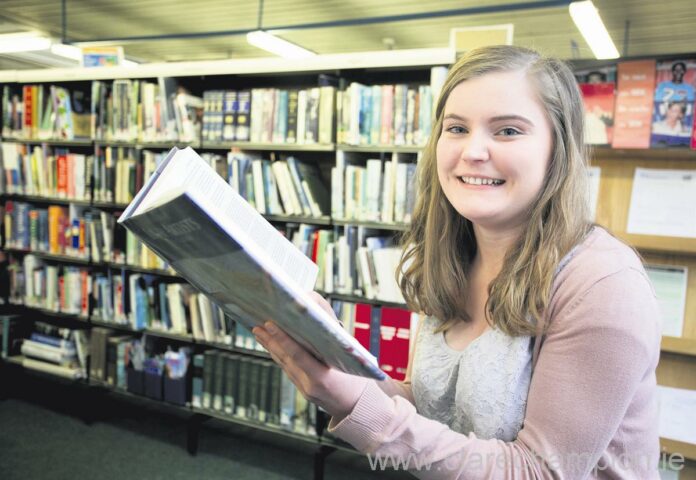By Eve Quinn, Coláiste Muire, Enis.
Highly commended, senior Clare Champion Short Story Competition.
THE Angelus chimed tunelessly over the whining tyres and impatient horns and babble of voices. Six o’clock was her favourite time of day – it always had been. The suit-clad businessmen and businesswomen bustled past, carrying bulging briefcases, wearing weary expressions. Their eyebrows were pulled together in frustration and their lips were sealed in a firm line of discontent. But beneath the hard exteriors, she could see the love, the hunger to be home, the longing to see family. Some stood waiting at the dilapidated bus stop. Others made their way towards the underground car park, where a private mode of transport awaited them. At six o’clock, everybody had a purpose. She could see what that must have felt like – to actually live for something.
As people passed her by, most avoided eye contact. Their eyes darted nervously or disgustedly or judgmentally to the other side of the busy street. A few carelessly tossed her some change as they hurried to be home, barely offering a glance as they did so.
And then there were the smiles. She might get one every few days, if she was lucky. Some would smile timidly, some guiltily as they demonstrated their lack of cash. Others would patronisingly lift up the corners of their mouths, crinkle their eyes and tilt their heads. Then there were the rarest, those who would grin shamelessly at the untouchable, just wishing to be friendly, not caring what onlookers would think of their brazen act. But every smile, no matter the type, was priceless. It made her feel part of their world, almost human again. No amount of loose change could have beaten the inexplicable warmth of acceptance.
The street was growing quieter now. The worn-out, homebound buses had long since departed, sputtering from their overused exhausts. The underground car park had been emptied of its professional occupants. Now only the odd car passed with a gust of air and the choking scent of burning fuel.
The buildings were old – Georgian architecture, she had heard. The imposing wooden doors, painted various vibrant colours, suggested great importance. The large, high windows with little panes were covered from the inside with yellowing lace blinds, restricting her view of the buildings’ interiors. She assumed they must once have been the homes of wealthy, successful people, but now they were used as offices, shops, or pubs.
The approaching night cast a shadow over the city, which seemed to darken at an alarming rate. The street felt so different now that it was empty. It seemed a far longer distance down to the blinking traffic lights at the street’s end than it had mere hours previously.
She tried to remember what day it was. Friday, perhaps? Yes, she thought, it had to be Friday. Friday was good, because people came back out. They returned home after a hard day’s work and came back out to forget about the stresses of the week. She enjoyed watching the transformations: the dresses, the heels, the makeup, the hair.
It was colder now. She pulled her threadbare blankets tighter around her shoulders, and took a swig from the bottle she’d been nursing on her lap. She wasn’t an alcoholic. But she craved the warmth of the vodka as it scalded her throat. It burnt its way into her body and the fire it lit inside her provided a source of heat no hearth could ever recreate.
When the first people started to reappear, she knew it had to be after 10. The girls wore dresses that sparkled and glittered, and heels that raised them far above the ground. Their hair was up in extravagant styles or cascading in graceful locks around their glamorously decorated faces. The boys seemed to have made less of an attempt with their appearances, but she knew they tried just as hard.
It didn’t take them long to get drunk. Soon they were clumsily toppling over one another, laughing madly, flirting furiously, falling in and out of the roaring pubs and flashing nightclubs. But they seemed to be enjoying themselves.
They didn’t really pay any attention to her, for which she was grateful. The bench she called home was a little way down the street from where they generally congregated, and in the darkness she was more or less invisible.
She was getting colder now. The metal bench didn’t do much to keep her warm, and the alcohol was running low. She sat shivering, drifting in and out of consciousness as the night unfolded.
Before she knew it, the black soot of the night sky had turned to charcoal, then to smoke, before finally settling on the gravelly colour Irish skies seem to favour.
There would be fewer people coming to work today, and those who did dragged a heavier set of feet. The ones who were free wandered about, getting in some Saturday morning shopping, cheery with the prospect of a whole two days to go before they had to return to the monotony of work.
People tossed her more change on a Saturday. She got more smiles on a Saturday. She counted the coins she had gathered in her tattered paper cup. She probably had enough to replace the bottle she’d finished the previous night. Maybe she could afford something to eat as well. But right now, she felt too tired, and couldn’t bring herself to get up off the bench. Maybe later, she decided.
The street got busier as the day went on. Bickering families were clothes-shopping. Giggling friends were meeting up for lunch, for coffee, for gossip. Buses and cars came and went. People passed her carrying crinkling paper bags of new clothes or rustling plastic ones of groceries. People chucked coffee cups and chewing-gum and scrunched-up receipts in the bin as they hurried past, everybody having such purpose.
She felt colder than she ever had; she had never properly warmed up. She felt weary and weak, and she struggled to remember how to wriggle her limbs. Breathing had become harder, and her lungs seemed unable to match her body’s demand for oxygen. Slowly, but not reluctantly, she let her eyes drift shut, and suddenly, everything was so much easier.
The Angelus chimed tunelessly over the whining tyres and impatient horns and babble of voices. Six o’clock was her favourite time of day – it always had been.
More stories to follow.
A native of Ennis, Colin McGann has been editor of The Clare Champion since August 2020. Former editor of The Clare People, he is a journalism and communications graduate of Dublin Institute of Technology.




